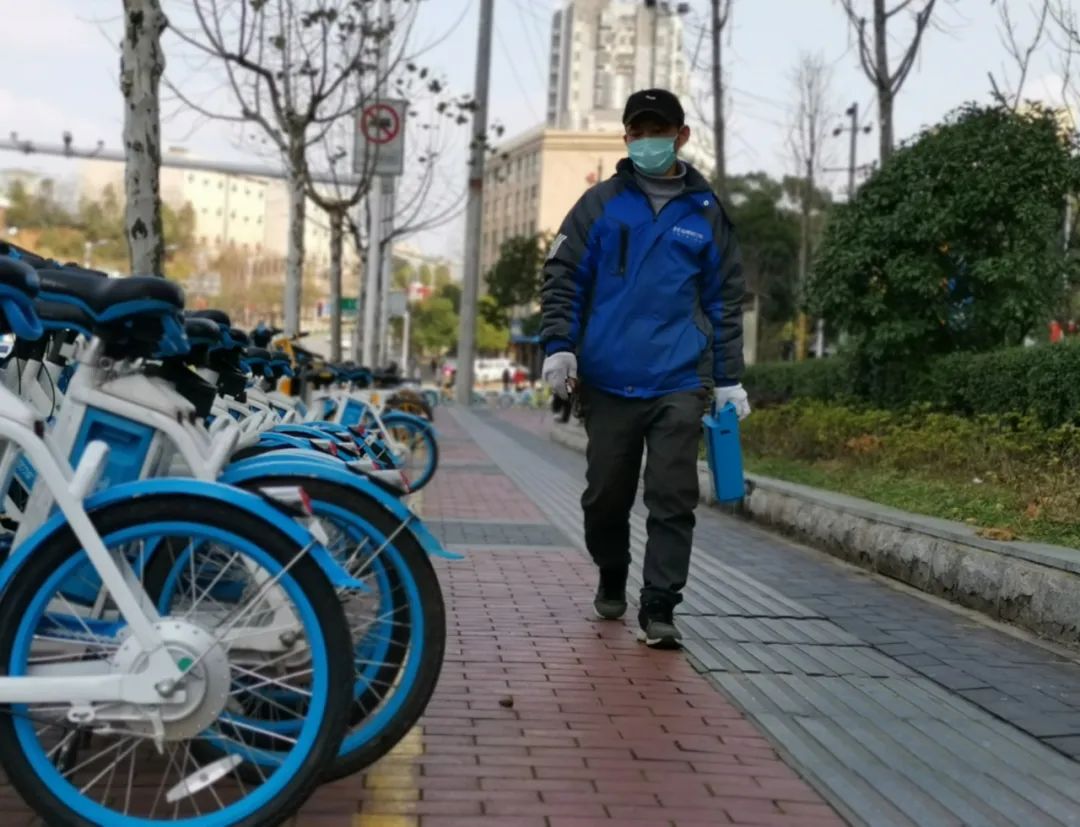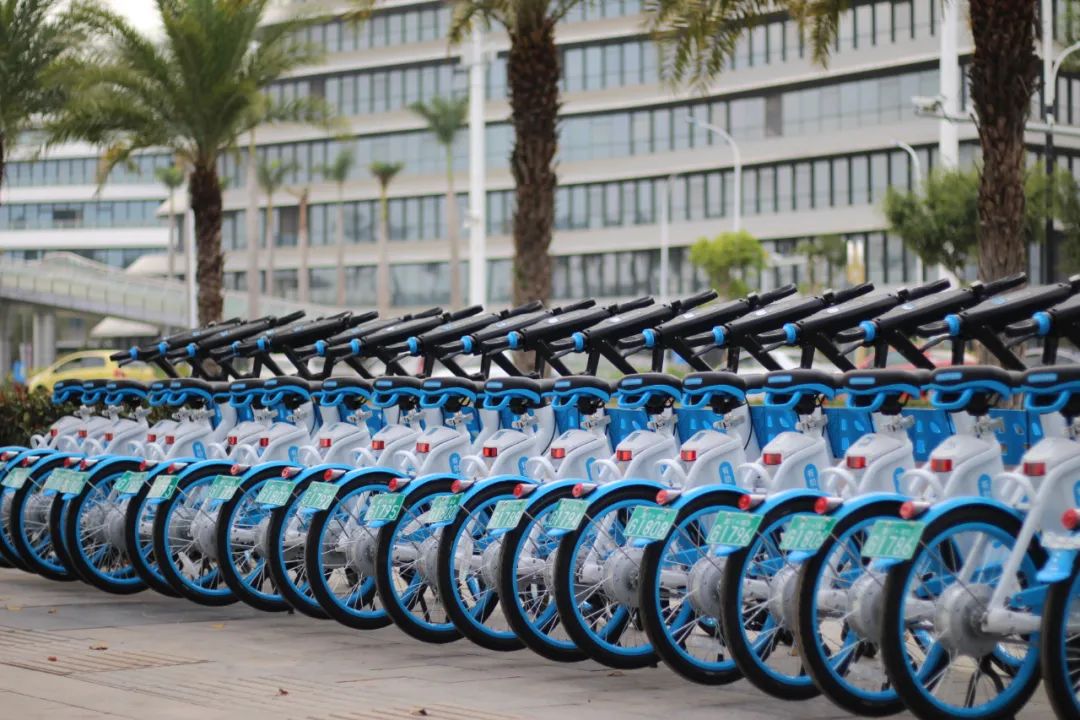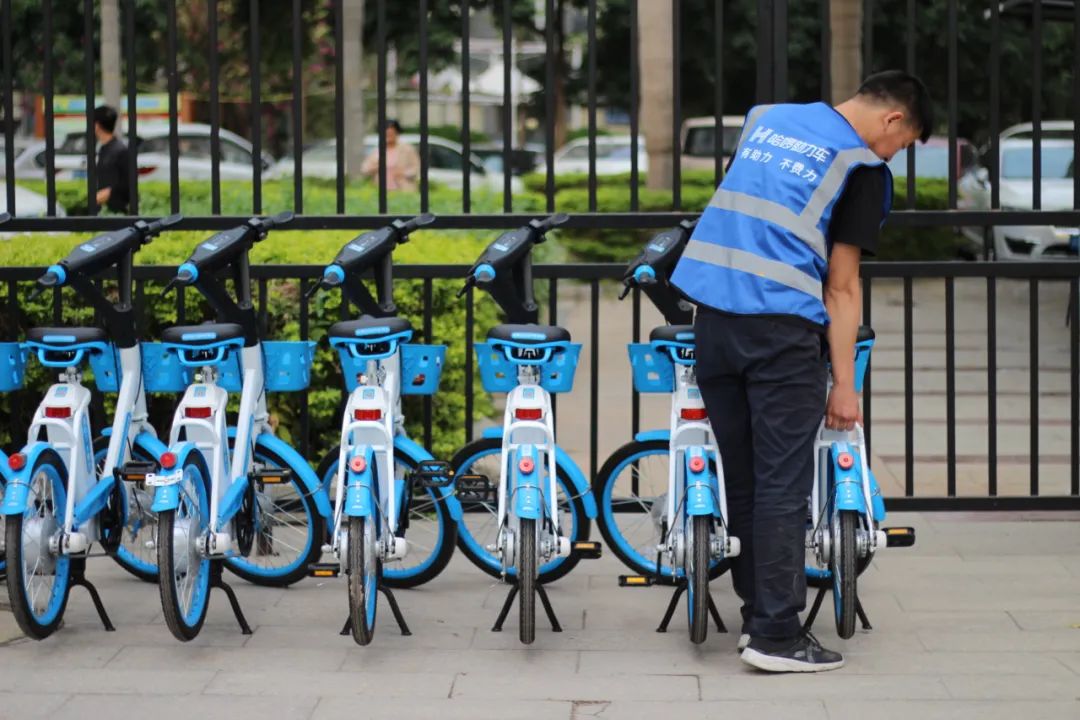Hello Travel: A breakout in the melee of shared bicycles, how to do motorcycle business?
Author:Qin Guan
Time:2020/09/24
Reading: 6116
After more than 5 years of melee and silence in the shared two-wheeler industry, the war has rekindled because of "motorcycles". Meituan stated in their latest financial report in August that they […]

After more than 5 years of melee and silence in the shared two-wheeler industry, the war has rekindled because of "motorcycles".
Meituan stated in its latest financial report in August that they invested nearly300,000 motorcycles, will further increase investment in the future. Wang Xing also mentioned at the financial report meeting that shared motorcycles have long-term strategic significance for Meituan, because it has a more efficient average turnover rate, better unit economic benefits, short-term profitability and huge market opportunities.
Coincidentally. In April this year, Didi Chuxing CEO Cheng Wei announced that in the next three years, he will serve 100 million orders per day globally, with a domestic travel penetration rate of 8% and global service user MAU exceeding 800 million. Under this goal, motorcycles are one of the key directions of Qingju this year, and Qingju also announced in April that it has received a large-scale financing of more than 1 billion US dollars.
Meituan and Didi Qingju’s high-profile entry and deployment of motorcycles this time has the posture of competing with each other when shared bicycles emerged five years ago. However, this competitive situation inevitably makes people worry: excessive deployment of vehicles is likely to cause waste of resources, repeating the mistakes of companies such as ofo and Mobike in the past.
Recently, Chu Yiqun, General Manager of the Bicycle Division of Harbin Travel, mentioned to 36 Krypton:"We hope that the industry can learn from the experience and lessons of the early development of shared bicycles. If excessive and disorderly launch, without fully considering the city's unit population density, GDP level, travel distance, and population distribution, it will damage the image of the industry in the government and the city."

Founded in September 2016, Hello Travel, although it entered the market late, has successfully counterattacked the industry leader in the shared bicycle melee. Hello’s successful breakout is due to several important strategic decisions: In March 2018, Hello and Ant Financial launched the first nationwide promotion of “credit free deposit” in the industry, breaking the long-standing business model of “relying on deposits to quickly return funds” in the shared bicycle industry.
But for assets-heavy and operation-heavy businesses, "no deposit" means that operating efficiency must be greatly improved in order to reduce costs and increase profits as soon as possible. To this end, Harbin has developed a smart system "Hello Brain", which uses algorithms and big data to make smart planning, smart scheduling, and smart dispatch of shared bicycles and motorcycles, and has launched innovative models such as Bluetooth road studs, electronic fences, and smart public mopeds.
At present, these new measures have achieved initial results. According to official information, in nearly 200 cities across the country that use Hello Brain intelligent scheduling, compared with manual experience scheduling, each motorcycle can serve at least one more user per day on average.
Recently, in an exclusive interview with 36 Krypton and other media, Chu Yiqun, General Manager of the Bicycle Division of Harbin Travel, explained in detail the market structure and industry stage of shared motorcycles, Harbin’s operating strategy and future plans. He mentioned that there are currently 3-4 large players in the shared motorcycle market, and many small players are distributed in different urban areas, which is similar to the melee situation in the early days of shared bicycles, but the profit model of motorcycles is better, and the reshuffle time will be longer.
In addition, Chu Yiqun said that shared two-wheel travel has entered the 3.0 stage and has become an indispensable part of urban public transportation. Although affected by the epidemic at the beginning of the year, revenue has declined, but since May and June, the gross profit of the bicycle business has returned to positive.
The following is the main content of the interview:
Two-wheel travel enters the 3.0 stage:
It is an integral part of urban public transport
In September, Hello Travel has been established for 4 years and announced that the number of registered users has exceeded 400 million. How do you see the changes in the field of shared two-wheel travel in the past 4 years?
Chu Yiqun: The development of China’s shared bicycle industry can be roughly divided into three stages: the first stage is the start and melee of 1.0. At that time, there were seven or eight colors of bicycles in the country, and they all relied on deposits to realize the rapid return of funds. Therefore, the company at that time did not need to consider whether the amount of investment was appropriate, but just invested, because for every additional car invested, the deposit of two or three people was collected, and the cost of building a car of 300 yuan was returned. That was the biggest essence of over-investment at that time.
Hello is one of the last batch of players to enter the game, entering from the second and third tier cities. At that time, the two companies, OFO and Mobike, were already very large. We picked a breaking point - the deposit. We believe that. This industry relies on the improvement of supply and demand matching efficiency to serve users' travel, and users should not be allowed to take deposit risks. Therefore, in March 2018, we launched the credit free deposit together with Alipay, which is the first time to reorganize and reshuffle the entire industry.
Choosing to be free is a typical balance between long-term and short-term interests. At that time, the unit price of motorcycles was still very low, and in many cases it was free, and it was inevitable that there would be losses for a period of time. At that time, investors would feel that this model was originally a good cash flow model, but it disappeared immediately and was unhealthy. But only after the heat fades will you see the rational reef. Even with the impact of the epidemic this year, we started from May and June, and the gross profit of the bicycle business has returned to positive.
By the 2.0 stage, almost all the previous players had withdrawn from the market, the deposit of OFO had been thundered, Mobike was sold to Meituan, only Hello was still there, and Qingju from Didi entered the market later. All companies have begun to emphasize the efficiency of dispatching operations, like Harbin, and gain incremental value by improving efficiency, and have entered a relatively healthy development stage.
Now it is the 3.0 stage, the government’s attitude towards shared bicycles has changed, from what was considered a scourge at first, to now it truly recognizes the value of bicycles. Shared two-wheel travel should be formally included as a component of public transportation to improve the overall traffic efficiency of the city.
Motorcycles are a long-distance running business
Call for rational development of the industry
Specific to the motorcycle business, what changes have you observed in this industry?
Chu Yiqun: Harbin was the first company to experiment with shared motorcycles. It started in September 2017 and soon became a leader. The initial operation of motorcycles is a fixed-point model. Because the cost of motorcycles is relatively high, we need to ensure that they have sufficient operational efficiency while reducing the risk of loss and private possession. Hello basically verified that this model is relatively feasible. This year is a blowout year for the motorcycle industry, a bit like the initial development stage of shared bicycles. At present, there are 3-4 large players, and many small players are located in different cities. In core cities such as Changsha, more than 10 colors of motorcycles can be seen in operation.
The reason why everyone came in this year, I think it is mainly because Haro ran out the model last year. The new national standard policy for two-wheelers also has a certain boosting effect, but in essence, it is because we have proved that this business can be profitable.
Is it because Hello motorcycles are made in third- and fourth-tier cities, and these cities have relatively loose policies and controls on motorcycles, but first-tier cities have many restrictions?
Chu Yiqun: There are also reasons for this, because from the current point of view, the entire sinking city is very welcoming to motorcycles, because the public transportation system is not as developed as that of first-tier cities. However, the operation of small cities also has complexities that many large cities cannot match. If the operating efficiency is not high and the user utilization rate is not high, it will be difficult to support the operation. Therefore, companies such as Mobike have not entered the sinking market much.
Will there be a first-mover advantage in the motorcycle market?
Chu Yiqun: There will definitely be. Like bicycles, after a period of time, you will have data accumulation and a better closed loop to guide your operations. The situation in each city is different, so we operate one city at a time. At the beginning, our operation efficiency will definitely be higher than that of other peers in the industry. At the same time, we will also maintain a sense of crisis, because I believe that our peers are also very good. This will force us to run faster. Everyone in the industry will work together to promote this industry. It will promote the prosperity of this industry faster, which is also a good thing for us.
I saw before that the market share of Motorcycle Hello is 70%, is it still the same?
Chu Yiqun: At that time, Haro did it relatively early. At that time, the earliest predecessors had already died on the beach. Because Haro has blazed a path that can basically cover the profit model on the basis of bicycles. Many people were waiting and watching before. After the pioneers have gone for a while, the market sees that this is established, and new vehicle products will naturally be launched. It is inevitable that our market share will fluctuate at this time. Harbin has always emphasized the efficiency of operation and maintenance, rational development, and coordination with urban public transport. It has always followed such a strategy and road, which means that we cannot pave a large number of vehicles in a short period of time to fill up the road. This is not a development strategy. Therefore, within a certain period of time, the market share decline is inevitable. Generally speaking, whether it is a bicycle or a motorcycle, it is a long-distance running business, and your accumulation will make you run faster and faster.
Why did Harbin see the opportunity of motorcycles first, but other leading companies did not see it?
Chu Yiqun: It’s not that no one has seen it, and some people have made motorcycles during the bike-sharing period, but motorcycles, like bicycles, emphasize operational efficiency, not a simple business. Harbin has a great advantage in making motorcycles—we operate bicycles ourselves, and have accumulated a large amount of operating data and understanding of the industry. For example, Harbin was the first to operate bicycles in Hefei. Through the intelligent operation and maintenance BOS system of "Hello Brain", it has accumulated thousands of hot spots in the city. These data helped us save a lot of planning and trial and error time when the motorcycle started, and built this model very quickly.
Moreover, Harbin has always emphasized the operation and maintenance capabilities, and the scheduling and deployment of shared bicycles are often carried out through algorithms. Therefore, after the launch of our motorcycles, we quickly achieved profitability and gained a firm foothold. In contrast, other new brands do not have such data and operation and maintenance capabilities at the beginning, and it takes a long time to accumulate data and operation and maintenance.
How long do you think it will take for an oligarch to emerge in the motorcycle industry?
Chu Yiqun: I can't predict it precisely, but I believe it may be slightly longer than a bicycle.
What are the pain points and problems in the motorcycle industry now?
Chu Yiqun: We hope that the industry can learn from the experience and lessons of the early development of shared bicycles. If excessive and disorderly delivery is made and the city's unit population density, GDP level, travel distance, and population distribution are not fully considered, it will damage the image of the industry in the government and the city.
Motorcycles can achieve a relatively good positive gross profit in the short term, but for a longer period of time, it depends on whether the short-term gross profit can be continuously invested in operations to form a long-term sustainable replicative operating capacity. During this process, players who were initially attracted by the profit model will gradually withdraw from the market. But this reshuffle process may be slower than that of bicycles. After all, the initial investment is larger and the profit return curve is better.
It's not difficult for you to do a good job of dispatching and arranging cars in one month. What is difficult is to do it with the same quality or even higher quality in one year, two years, or three years, especially when the plate is bigger. It's the same reason why husband and wife stores make money, but once they open a chain, they lose money.
Refined operation is the core at this stage
What is the most important thing you have done since joining Hello in 2017?
Chu Yiqun: The main task I came here at that time was to build a middle platform for the bicycle business, and to connect the technical personnel in the background with the actual business needs of the front end. Although the frontline operation team at that time had a preliminary intelligent operation and maintenance BOS system and accumulated data, they had not yet figured out how to use these data to improve efficiency. After I came here, I mainly turned the previously accumulated data into algorithm strategies, such as scheduling algorithms and faulty vehicle processing algorithms, to predict whether a vehicle will break down. Then turn them into a set of data models and implementation mechanisms to drive teams of thousands or even tens of thousands of people across the country.

What experience has the motorcycle learned from the process of cycling? What experiences can be applied to motorcycles?
Chu Yiqun: The core is the emphasis on operation and maintenance efficiency, which will be inherited and absorbed from the past. Specifically, when it comes to practical operations, point selection, and calculation of vehicle density deployment, every time a city is opened, a large amount of various data will be obtained from the city to calculate the reasonable number of deployments in this city. Such judgments, and then our entire operation and maintenance system, the construction of the organizational system and the functions of BOS-end products, these are actually from bicycles that can be absorbed into motorcycles.
How do you reduce costs and increase efficiency?
Chu Yiqun: This business requires efficiency in many details. The "cost reduction" we understand is not to reduce a certain cost, but to increase the ROI (return on investment) of each expense. For example, it is hard to say whether the more scheduling costs are spent, the better, or the less the better, this is hard to say, so we compare the income generated by each scheduling and the income generated by no scheduling. This requires a large amount of data accumulation to predict.
In June last year, Harbin Travel, Ant Financial and Ningde Times jointly invested 1 billion yuan to establish a joint venture company to build power stations and deploy energy networks for two-wheeled electric vehicles nationwide. How much does this support the battery replacement of your motorcycles?
Chu Yiqun: The joint venture company will support the efficiency improvement of our warehouse battery swap model through the deployment of power swap cabinets. Our main battery replacement mode is to charge in the battery compartment, and after charging, pull it to the city to change the battery. From the perspective of the deployment of Ningde energy technology network, if they have such a cabinet in the core area of the city, our battery changers don't have to travel so far, and can get the battery of the tram cabinet by riding a short distance, which greatly improves efficiency.









